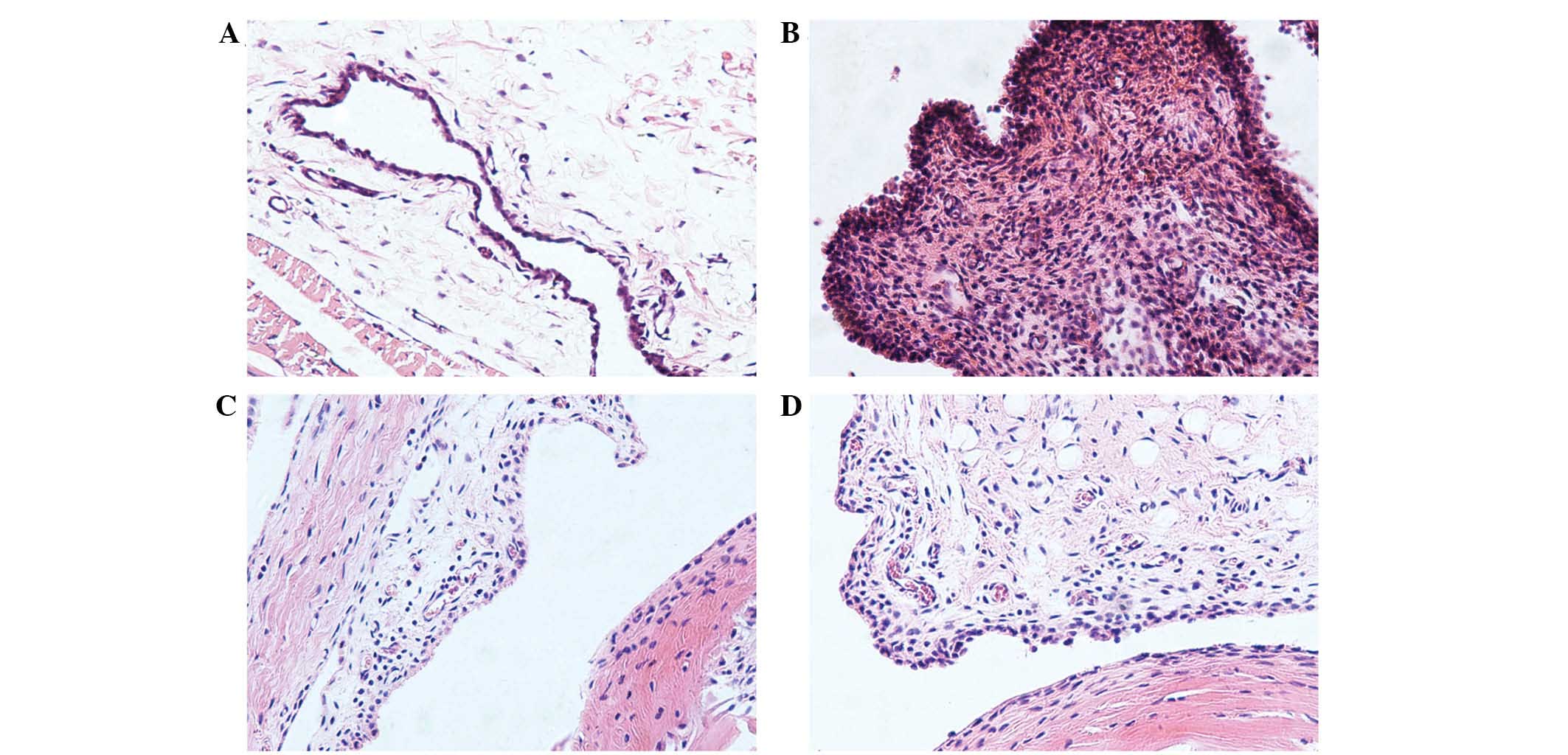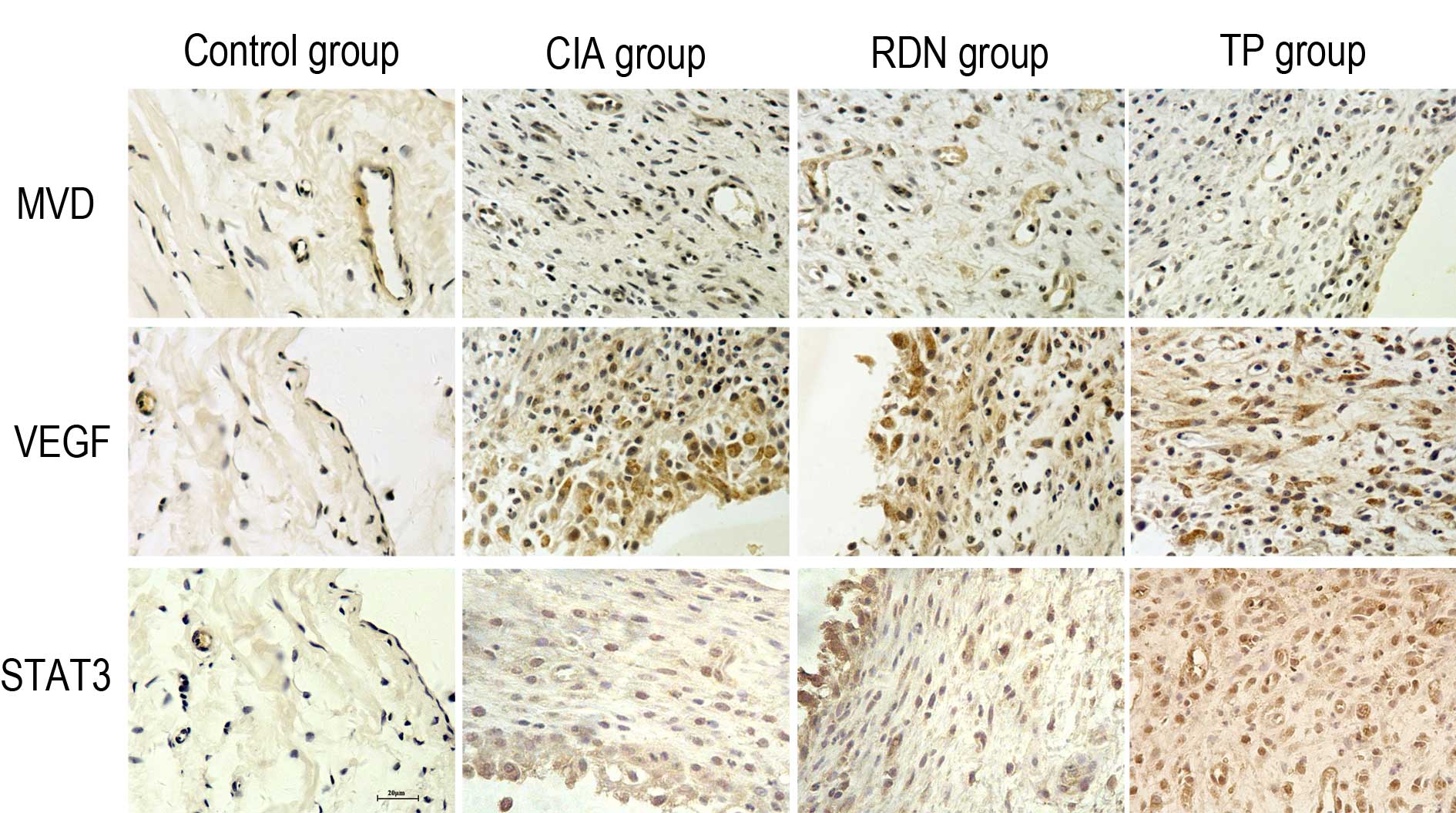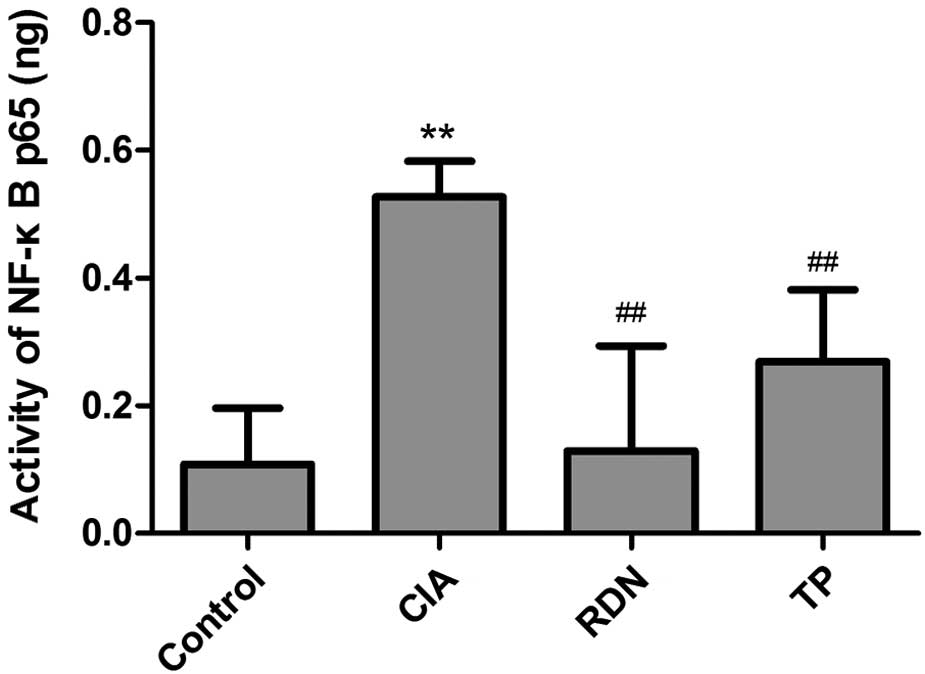|
1
|
Harris ED Jr: Rheumatoid arthritis.
Pathophysiology and implications for therapy. N Engl J Med.
322:1277–1289. 1990. View Article : Google Scholar : PubMed/NCBI
|
|
2
|
Feldmann M, Brennan FM and Maini RN: Role
of cytokines in rheumatoid arthritis. Annu Rev Immunol. 14:397–440.
1996. View Article : Google Scholar : PubMed/NCBI
|
|
3
|
Gabriel SE: The epidemiology of rheumatoid
arthritis. Rheum Dis Clin North Am. 27:269–281. 2001. View Article : Google Scholar : PubMed/NCBI
|
|
4
|
McInnes IB and Schett G: The pathogenesis
of rheumatoid arthritis. N Eng J Med. 365:2205–2219. 2011.
View Article : Google Scholar
|
|
5
|
Marrelli A, Cipriani P, Liakouli V,
Carubbi F, Perricone C, Perricone R and Giacomelli R: Angiogenesis
in rheumatoid arthritis: A disease specific process or a common
response to chronic inflammation? Autoimmun Rev. 10:595–598. 2011.
View Article : Google Scholar : PubMed/NCBI
|
|
6
|
Fava RA, Olsen NJ, Spencer-Green G, Yeo
KT, Yeo TK, Berse B, Jackman RW, Senger DR, Dvorak HF and Brown LF:
Vascular permeability factor/endothelial growth factor (VPF/VEGF):
Accumulation and expression in human synovial fluids and rheumatoid
synovial tissue. J Exp Med. 180:341–346. 1994. View Article : Google Scholar : PubMed/NCBI
|
|
7
|
Walker JG and Smith MD: The Jak-STAT
pathway in rheumatoid arthritis. J Rheumatol. 32:1650–1653.
2005.PubMed/NCBI
|
|
8
|
Tak PP, Gerlag DM, Aupperle KR, van de
Geest DA, Overbeek M, Bennett BL, Boyle DL, Manning AM and
Firestein GS: Inhibitor of nuclear factor kappaB kinase beta is a
key regulator of synovial inflammation. Arthritis Rheum.
44:1897–1907. 2001. View Article : Google Scholar : PubMed/NCBI
|
|
9
|
Chen Z and Han ZC: STAT3: A critical
transcription activator in angiogenesis. Med Res Rev. 28:185–200.
2008. View Article : Google Scholar : PubMed/NCBI
|
|
10
|
Karin M: Nuclear factor-kappaB in cancer
development and progression. Nature. 441:431–436. 2006. View Article : Google Scholar : PubMed/NCBI
|
|
11
|
Smolen JS, Aletaha D, Koeller M, Weisman
MH and Emery P: New therapies for treatment of rheumatoid
arthritis. Lancet. 370:1861–1874. 2007. View Article : Google Scholar : PubMed/NCBI
|
|
12
|
Yan W, Ji L, Hang S and Shun Y: New ionic
liquid-based preparative method for diosgenin from Rhizoma
dioscoreae nipponicae. Pharmacogn Mag. 9:250–254. 2013. View Article : Google Scholar : PubMed/NCBI
|
|
13
|
Wang TS, Liang SJ, Lii CK and Liu SY:
Protective effect of water yam (Dioscorea alata L.) extract on the
copper driven fenton reaction and X-ray induced DNA damage in
vitro. Phytother Res. 18:325–328. 2004. View Article : Google Scholar : PubMed/NCBI
|
|
14
|
Jeon JR, Lee JS, Lee CH, Kim JY, Kim SD
and Nam DH: Effect of ethanol extract of dried Chinese yam
(Dioscorea batatas) flour containing dioscin on gastrointestinal
function in rat model. Arch Pharm Res. 29:348–353. 2006. View Article : Google Scholar : PubMed/NCBI
|
|
15
|
Yao L, Dong W, Lu F and Liu S: An improved
acute gouty arthritis rat model and therapeutic effect of rhizoma
dioscoreae nipponicae on acute gouty arthritis based on the
protein-chip methods. Am J Chin Med. 40:121–134. 2012. View Article : Google Scholar : PubMed/NCBI
|
|
16
|
Wooley PH, Luthra HS, Stuart JM and David
CS: Type II collagen-induced arthritis in mice. I. Major
histocompatibility complex (I region) linkage and antibody
correlates. J Exp Med. 154:688–700. 1981. View Article : Google Scholar : PubMed/NCBI
|
|
17
|
Cremer M: Type II collagen-induced
arthritis in ratsHandbook of Animal Models for the Rheumatic
Diseases. Greenwald RA and Diamond HS: 1. CRC Press; Boca Raton,
FL: pp. 17–27. 1988
|
|
18
|
Welles WL and Battisto JR: Suppression of
adjuvant arthritis by antibodies specific for collagen type II.
Immunol Commun. 10:673–685. 1981. View Article : Google Scholar : PubMed/NCBI
|
|
19
|
Anic GM, Thompson RC, Nabors LB, Olson JJ,
Browning JE, Madden MH, Murtagh FR, Forsyth PA and Egan KM: An
exploratory analysis of common genetic variants in the vitamin D
pathway including genome-wide associated variants in relation to
glioma risk and outcome. Cancer Causes Control. 23:1443–1449. 2012.
View Article : Google Scholar : PubMed/NCBI
|
|
20
|
Yamanishi Y, Boyle DL, Pinkoski MJ,
Mahboubi A, Lin T, Han Z, Zvaifler NJ, Green DR and Firestein GS:
Regulation of joint destruction and inflammation by p53 in
collagen-induced arthritis. Am J Pathol. 160:123–130. 2002.
View Article : Google Scholar : PubMed/NCBI
|
|
21
|
Ferrara N and Kerbel RS: Angiogenesis as a
therapeutic target. Nature. 438:967–974. 2005. View Article : Google Scholar : PubMed/NCBI
|
|
22
|
Semerano L, Clavel G, Assier E, Denys A
and Boissier MC: Blood vessels, a potential therapeutic target in
rheumatoid arthritis? Joint Bone Spine. 78:118–123. 2011.
View Article : Google Scholar : PubMed/NCBI
|
|
23
|
Ferrara N: Role of vascular endothelial
growth factor in the regulation of angiogenesis. Kidney Int.
56:794–814. 1999. View Article : Google Scholar : PubMed/NCBI
|
|
24
|
Carrato A, Gallego-Plazas J and
Guillen-Ponce C: Anti-VEGF therapy: A new approach to colorectal
cancer therapy. Expert Rev Anticancer Ther. 6:1385–1396. 2006.
View Article : Google Scholar : PubMed/NCBI
|
|
25
|
Lee SS, Joo YS, Kim WU, Min DJ, Min JK,
Park SH, Cho CS and Kim HY: Vascular endothelial growth factor
levels in the serum and synovial fluid of patients with rheumatoid
arthritis. Clin Exp Rheumatol. 19:321–324. 2001.PubMed/NCBI
|
|
26
|
Ballara S, Taylor PC, Reusch P, Marmé D,
Feldmann M, Maini RN and Paleolog EM: Raised serum vascular
endothelial growth factor levels are associated with destructive
change in inflammatory arthritis. Arthritis Rheum. 44:2055–2064.
2001. View Article : Google Scholar : PubMed/NCBI
|
|
27
|
Lu J, Kasama T, Kobayashi K, Yoda Y,
Shiozawa F, Hanyuda M, Negishi M, Ide H and Adachi M: Vascular
endothelial growth factor expression and regulation of murine
collagen-induced arthritis. J Immunol. 164:5922–5927. 2000.
View Article : Google Scholar : PubMed/NCBI
|
|
28
|
Tao X, Cush JJ, Garret M and Lipsky PE: A
phase I study of ethyl acetate extract of the chinese antirheumatic
herb Tripterygium wilfordii hook F in rheumatoid arthritis. J
Rheumatol. 28:2160–2167. 2001.PubMed/NCBI
|
|
29
|
Walker JG, Ahern MJ, Coleman M, Weedon H,
Papangelis V, Beroukas D, Roberts-Thomson PJ and Smith MD: Changes
in synovial tissue Jak-STAT expression in rheumatoid arthritis in
response to successful DMARD treatment. Ann Rheum Dis.
65:1558–1564. 2006. View Article : Google Scholar : PubMed/NCBI
|
|
30
|
Shouda T, Yoshida T, Hanada T, Wakioka T,
Oishi M, Miyoshi K, Komiya S, Kosai K, Hanakawa Y, Hashimoto K, et
al: Induction of the cytokine signal regulator SOCS3/CIS3 as a
therapeutic strategy for treating inflammatory arthritis. J Clin
Invest. 108:1781–1788. 2001. View
Article : Google Scholar : PubMed/NCBI
|
|
31
|
Atsumi T, Ishihara K, Kamimura D, Ikushima
H, Ohtani T, Hirota S, Kobayashi H, Park SJ, Saeki Y, Kitamura Y
and Hirano T: A point mutation of Tyr-759 in interleukin 6 family
cytokine receptor subunit gp130 causes autoimmune arthritis. J Exp
Med. 196:979–990. 2002. View Article : Google Scholar : PubMed/NCBI
|
|
32
|
Krause A, Scaletta N, Ji JD and Ivashkiv
LB: Rheumatoid arthritis synoviocyte survival is dependent on
Stat3. J Immunol. 169:6610–6616. 2002. View Article : Google Scholar : PubMed/NCBI
|
|
33
|
Niu G, Wright KL, Huang M, Song L, Haura
E, Turkson J, Zhang S, Wang T, Sinibaldi D, Coppola D, et al:
Constitutive Stat3 activity up-regulates VEGF expression and tumor
angiogenesis. Oncogene. 21:2000–2008. 2002. View Article : Google Scholar : PubMed/NCBI
|
|
34
|
Wei LH, Kuo ML, Chen CA, Chou CH, Lai KB,
Lee CN and Hsieh CY: Interleukin-6 promotes cervical tumor growth
by VEGF-dependent angiogenesis via a STAT3 pathway. Oncogene.
22:1517–1527. 2003. View Article : Google Scholar : PubMed/NCBI
|
|
35
|
Makarov SS: NF-kappaB in rheumatoid
arthritis: A pivotal regulator of inflammation, hyperplasia, and
tissue destruction. Arthritis Res. 3:200–206. 2001. View Article : Google Scholar : PubMed/NCBI
|
|
36
|
Roman-Blas JA and Jimenez SA: NF-kappaB as
a potential therapeutic target in osteoarthritis and rheumatoid
arthritis. Osteoarthritis Cartilage. 14:839–848. 2006. View Article : Google Scholar : PubMed/NCBI
|
|
37
|
De Martin R, Hoeth M, Hofer-Warbinek R and
Schmid JA: The transcription factor NF-kappa B and the regulation
of vascular cell function. Arterioscler Thromb Vasc Biol.
20:E83–E88. 2000. View Article : Google Scholar : PubMed/NCBI
|
|
38
|
Xiong HQ, Abbruzzese JL, Lin E, Wang L,
Zheng L and Xie K: NF-kappaB activity blockade impairs the
angiogenic potential of human pancreatic cancer cells. Int J
Cancer. 108:181–188. 2004. View Article : Google Scholar : PubMed/NCBI
|


















